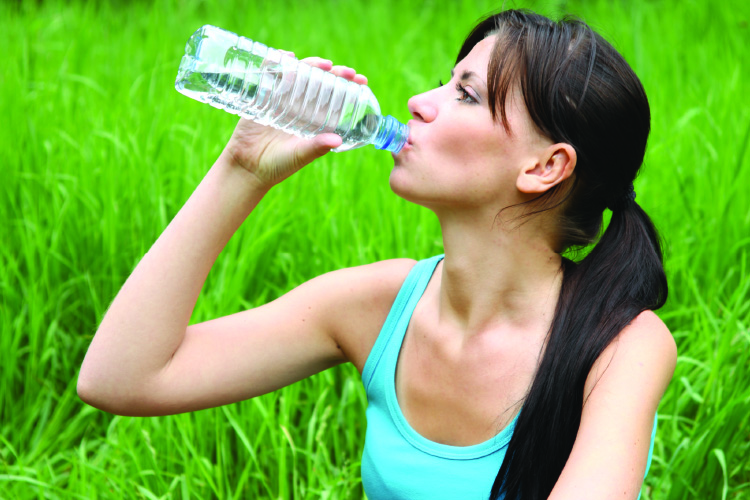Let’s review some basic facts about our total body of water. As infants, we started life with 75‑80% of water against body weight. As we age, it decreases to 60-65% for men and for women slightly less to about 50-60%. For obese people, the percentage is less due to higher fat content. Fat itself is 10-15% water. The brain and blood has over 80% water.
Water in your body cells is found either as intra-cellular fluids or extra-cellular fluids. The extra cellular fluids are located within the blood vessels (intravascular), between the blood vessels and cells (interstitial) and cerebrospinal, pericardial and joint fluids (trans-cellular). Regulation takes place continuously within these compartments so that the fluids are in homeostasis including proper pH function. Water in the blood carries the dissolved nutrients, salts, enzymes, co-enzymes, antibodies, hormones andoxygen throughout the body to meet its physiological needs. These dissolved substances are happening within your 70 trillion body cells sustaining your very life.
Starting with the brain organ, the billions of neurons are constantly transmitting messages through complex electrochemical processes and the brain depends on sufficient hydration to perform optimally.
Your kidneys require enough water to prevent stones from forming and to keep kidney damage from happening or worsening. The kidneys remove uric acid and urea which must be dissolved in water.
Undoubtedly, water is an essential nutrient for life. As in any essential nutrient, it has to come from our own intake, not made within. It is not surprising to overlook its importance probably due to our busy lifestyle; it is true that most people drink only when they feel thirsty. Maybe we can live for many days even months without food, but we can’t live long without water.
Table of Contents
What happens when we don’t drink enough?
When our body lacks water even for a day, our body produces symptoms that include thirst, dry mouth and throat, light-headedness, fatigue, decreased urine production, reduced skin elasticity and even heart palpitations. Dehydration happens when we lose 1% or more of body weight through fluid depletion. A dehydration of 2% losses can affect our physiological functions. For example a 70kg person who drops to 69kg right after exercise is likely to be dehydrated.
It is not coincidental that sufferers of chronic diseases have reported poor healing if there is insufficient intake of water. Probably the most vocal advocate of water as a cure for various pain or diseases was the late Dr F Batmanghelidj, a renowned author of a book titled ‘Your Body’s Many Cries for Water”. He believed that water is the missing element from the body that can prevent and help to cure painful degenerative diseases.
Here are some of the connections between health disorders and dehydration:
Arthritis Rheumatoid
Arthritis is one of the first signs of dehydration. It causes pain in the joints. Adequate water is necessary to flush out the toxic waste in the body. When the acid waste gets accumulated for some time, the brain gets the message that is reflected as pain.
Diabetes mellitus
Dehydration is also linked to adult-set diabetes. If the brain is to function well it needs water and glucose and should there be an inadequate intake of water, sugar level may rise in comparison.
Asthma
Through normal breathing, our lungs lose fluids. When the body doesn’t get enough water, the body produces histamines as a response to compensate and that may cause bronchial constriction in the lungs.
Angina
Angina pain may be the first signs of dehydration. If chronic dehydration sets in, body acidity builds up and can eat into the cell linings of your arteries, to cause angina spasms.
Heartburn
The feeling of discomfort in the upper gastro-intestinal tract is probably a result of chronic dehydration. Antacid tablets, will not work as it can aggravate and cause further complications like ulceration and stomach inflammation.
Cholesterol
An elevated cholesterol level in the body is another effect of dehydration. Our blood cholesterol actually works to protect water loss by cells.
High Blood Pressure
When the body is lacking water, it attempts to hold on to the available water supplies by resorting to vascular constriction throughout the body to reduce the loss of water through the skin and through respiration.
Migraines
Migraines are also signs that your blood vessels are excessively dilated made worse by a lack of water. Drinking sufficient water cools down the inflammation of the vessels to prevent further enlargement thus alleviating pain.
Back Pain
Water in the spinal disks supports more than 75% of the upper body and lubricant for the back and neck motion. Low back pain and ankylosing arthritis are signs of water shortage.
Colitis
Pain in the large intestines happens when the large intestines squeezes the last drops of water from the waste which causes pain.
Are you having a weight issue at the moment? Water can be your aid to manage your weight because water suppresses your appetite. Get into the habit of drinking two glasses of water half an hour before meal. You will feel full and eat less too.
If you suffer from water retention, it does help to increase your water intake, especially if the oedema is caused by consuming too much table salt. Your body has the tendency to retain water to avoid losing more.
The truth of the matter is that water is one of the best remedies for our daily ailments. The cups of coffee and tea that you drink are not part of your water intake. Caffeine acts as a diuretic and thus works to eliminate more water. The same applies to alcoholic drinks. They are not counted as part of your eight glasses of water per day.
There are other ways to know if your water intake is sufficient. Dark brown urine often suggests you are not drinking enough water. Except for the morning urine that is darker, the urine production for the rest of the day should be slightly yellow if not clear. A normal adult need about 1 millilitre of water for each calorie consumed. This means that if the average caloric consumed per day is 1,500 kcal then the person will require about 1.5 litres of fluid intake a day. Physically active, children and overweight people will need to drink much more.
Sometimes it is not alright to drink only when you feel the thirst. Remember we are losing body fluids by the simple act of breathing and sweating. Thus it is indeed necessary to replenish it throughout the day.
5 Reasons How the Human Body Loses An Average of 2.3 liters of Water Everyday
Evaporation from the lungs – 350ml
The air that enters the lungs becomes moisturised before it is expelled. This can increase especially in cold weather.
Diffusion through the skin – 350ml
Independent of sweating. The above and this reason are called insensible water loss because we are not consciously aware of it.
Sweating – 100ml
May increase depending on the level of physical activity and the temperature of the environment.
Faeces – 100ml
Can increase in cases of severe diarrhoea.
Urine – 1.4 liters
The amount is highly variable depending on the person’s hydration status. It can be as low as 500ml/day in a dehydrated individual or as high as 20 litres in a person drinking large amounts of water.
















